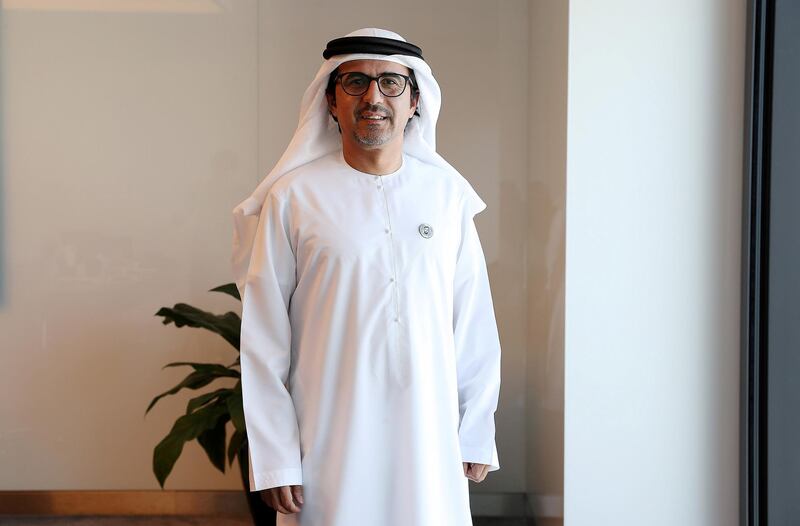Abu Dhabi-owned Mubadala Investment Company's integrated petroleum and petrochemicals unit is seeking lower-cost barrels of oil at home and across Asia, even as it positions itself as a strong player in the North American natural gas and chemicals industry, its CEO said.
Musabbeh Al Kaabi, who heads Mubadala’s Petroleum and Petrochemicals division after its integration with International Petroleum Investment Company (Ipic) last year, said the new entity’s bet on petrochemicals, in which they invested just over $3 billion in 2017 alone, had put them “on the right trajectory” post-merger.
"With these big transactions lately, it is fulfilling our strategic vision, but overall in the US, it's [a] very interesting dynamic, because [of] access to a highly competitive feedstock thanks to the shale revolution, and that's why [I] see an almost strategic shift to North America when it comes to the petrochemicals industries," Mr Al Kaabi said in an interview with The National in Abu Dhabi.
Mubadala's Petroleum and Petrochemicals platform, which is part of the estimated $127bn state fund, values its portfolio at $40bn today, with just over $8bn spent in the last year alone in a raft of upstream and downstream investments.
Gas, which accounted for 56 per cent of the entity’s portfolio in 2016, still dominates business with a pivot to acquiring lower-cost barrels of oil, through their acquisition of Spanish oil and gas company Cepsa.
“A strategic decision [has been taken] to invest in low-cost oil, which means that regardless what oil prices will look like in the future, hopefully our portfolio will remain resilient and profitable under any scenario going forward,” he said.
“Gas on the other hand is enjoying a very solid growth, almost 1.7 per cent CAGR [compound annual growth rate] and it’s a transitional fuel for less carbonised economies in the future,” he added.The company’s subsidiary Mubadala Petroleum recently took a 10 per cent stake in the Shorouk concession, part of Italy’s Eni-operated Zohr gas field, one of the largest gas discoveries in the Eastern Mediterranean.
The firm also recently took final investment decision on a gas field offshore Malaysia, for which Mubadala along with state oil company Petronas and Shell’s local affiliate will pledge equity stakes, with the possibility of other financing options in the future, said Mr Al Kaabi.
_______________
Read more:
[ Mubadala buys 10% stake in Egyptian Shorouk concession from Eni ]
[ Nova Chemicals and Borealis finalise $1.7 billion Texas chemicals joint venture with Total ]
_______________
Mubadala is now seeking more stakeholders for Cepsa, which it acquired through Ipic in 2011.
“We are exploring options to list the company in Spain, to bring a strategic partner, but it is still at a very early stage. We do that because the company is very solid now in their portfolio, their financial and operational performance is excellent,” said Mr Al Kaabi.
Madrid-headquartered Cepsa balances Mubadala’s gas-leaning portfolio, with its exposure to oil assets in South America, South East Asia and Kenya, as well as a significant portfolio of chemical assets, notably linear alkyl benzene (LAB) - which finds uses in the detergent industry.
The Spanish firm in February won a 20 per cent stake worth $1.5bn in the twin concessions of Umm Lulu and SARB, which lie offshore the territorial waters of Abu Dhabi.
The company is also currently undertaking feasibility for a 150,000-tonne LAB facility to be integrated with Abu Dhabi National Oil Company’s Ruwais refinery. Feasibility on the facility is "almost completed,” said Mr Al Kaabi.
Cepsa’s recent successes offshore and onshore the UAE had made it “very attractive for many investors,” he said, adding that the company would likely “list hopefully in Spain” and was targeting 2018 as the appropriate timeline.
Mubadala was seeking partners “that shared similar values,” he added.
The company was also looking to shape Cepsa into an integrated energy company, with renewable components such as wind and solar also likely added to the mix.
“When it comes to integrated energy companies, being in Europe, and being an international company, it is very important that it is part of all energy sources and definitely renewable energy,” said Mr Al Kaabi.
Mubadala, which owns 25 per cent of Austrian oil and gas company OMV would “welcome any further collaboration between OMV and Adnoc,” said Mr Al Kaabi. The Austrian firm was said to be in talks for a stake in Adnoc’s split Adma-Opco concessions as it looked to diversify its exposure to Russian gas investments.
“OMV historically has been part of a consortium to evaluate Shuwaihat sour gas field and took an exploration block east of Abu Dhabi so they’re usually active with Adnoc, upstream and downstream,” he added.
Elsewhere, Mubadala is set to conclude investment decision on a new refinery with “north of 200,000 barrel per day capacity” with Karachi-based Pak Arab Refinery Company (in the south of Pakistan,“by the end of the year or early next year.”
The project, which is at an engineering phase is awaiting conclusion of studies and will likely see a “massive investment in oil and gas for Pakistan”, should the partners sufficiently gauge the attractiveness of the venture, added Mr Al Kaabi.
The upcoming refinery could likely use Abu Dhabi crude, he added.
Mubadala, which has been optimistic about the US energy investment landscape, is also considering opportunities in the liquefied natural gas (LNG) sector, which has seen the emergence of smaller module-sized operators, who have begun to seek out equity partnerships from off-takers.
The company, which was said to have had discussions with the planned 27.6 million tonne-capacity Tellurian LNG facility in the US state of Louisiana, had made “a small investment in shale or unconventional gas” and “was monitoring that space”, Mr Al Kaabi said without elaborating.
Two factors - an acceptable Henry Hub price, the benchmark used to price natural gas, as well as an acceptable liquefaction cost - would need to be arrived at to make the US a more competitive player in the global gas markets, he added.







